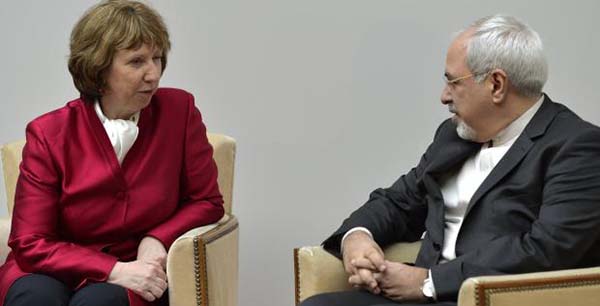Iran and the world powers are inching towards a deal in negotiations over Iran’s nuclear program that has been source of tensions between Tehran and the Western countries for over one last decade. Iran’s foreign Minister has said that both sides are preparing for compiling of the final agreement for this round of talks. As foreign ministers of the 5+1 – including five permanent members of the UN and Germany – have joined the negotiators in Geneva, optimisms for reaching a major agreement are high and, unlike the previous negotiations in the past, both sides remain optimistic. According to reports, some important agreements have been made during the talks; however, still there are many issues yet to be resolved. Last night, Iran foreign Minister Mohammad Jawad Zarif met US Secretary of State John Kerry and the 5+1 negotiator chief Catherine Ashton. Officials present in Geneva suggested after the meeting that both sides have made breakthrough in last night’s meeting.
Though there are optimisms for reaching a major nuclear deal between Iran and the world powers, reaching a final agreement that could resolve Iran’s nuclear standoff is unlikely. The flurry of diplomatic trips of the 5+1 foreign ministers suggest that the negotiations are making some major breakthrough and might lead to some sorts of agreement for limiting Iran’s nuclear proliferation activities. However, as France Foreign Minister suggested, there are still some major differences between the two sides that make prospects of resolving the issue in a short span of time dim. Seemingly, Iran is resisting to a proposal by the world powers to limit the country’s proliferation activities and reducing the level of its stocks of enriched uranium to the extent that could prevent Iran from making atomic weapons.
On the other hand, the world powers insist that any agreement between Iran and the 5+1 group should include imposing restrictions on Iran’s nuclear activities particularly enriching high level uranium. By this, they want to ensure that Iran is going to abide by its agreements and halt enriching high level uranium that can be used for atomic bomb. In return, the US has announced that it was ready to decrease sanctions imposed on Iran to a limited and reversible extent. This is while continuation of uranium enrichment is Iran’s red line and the country has warned it will not negotiate its right for continuation of uranium enrichment for peaceful nuclear activities. It seems that Iran’s insistence on maintaining the right for enriching uranium is the most challenging issue in the talks. French Foreign Minister Laurent Fabius has expressed doubts whether the two sides will be able to agree on the issue.
This is the second round of talks between Iran and the 5+1 group of world powers after Hassan Rouhani won Iran’s presidency in a landslide victory. In previous round of negotiations, that was held last month in Geneva, Iran proposed a new proposal to the 5+1 group for resolving the standoff over its nuclear programs. Though the content of the proposal put forward by Iran is yet to be known, but the West has taken the proposal seriously and taking it as Iran’s determination for resolving the issue. In Iran, there have been unprecedented level of support from the country’s Supreme Leader and other institutions for Rouhani’s initiative for talks with the world powers aimed at lifting the UN-mandated economic sanctions as well those unilaterally imposed by the US and European Union.
In the proposal, which is unclear yet, Iran has probably proposed access of its nuclear facilities for inspections and reducing level of uranium enrichment, which enables Iran to develop atomic weapons. It seems that both sides have had serious talks over the main demands of the world powers for putting Iran’s nuclear programs under control. The demands include constant and unimpeded access of UN inspectors to Iran’s nuclear facilities including nuclear facility of Fordu and the military site in Parchin. It is likely that Iran accept abrupt inspections of its nuclear sites as it has hinted readiness for talks to grant access to international inspections from the facilities. Despite the thorny issues that might prevent a major or even a final nuclear deal between Tehran and the world powers, it seems that both sides are determined for having serious negotiations in order to reach a final deal over the standoff in next round of the talks, if not this time.
The signs of progress in the ongoing negotiations between Iran and the world powers in Geneva have angered Israel’s hawkish Prime Minister Benjamin Netanyahu who has long been advocating for use of force by the US and Israel to end Iran’s nuclear programs. It seems that Israel’s hope for use of force against Iran’s nuclear program with direct involvement of the US in any military action against Tehran has become dimmer than ever. In case of a broad agreement between Iran and the West, Israel will lose the chance of taking any unilateral military risk against Iran as it would be too costly for it without approval of its Western allies. It is also because that any agreement over Iran’s nuclear programs, Israel’s prime minister’s ruling party will be weakened in the country’s internal politics.
Despite American officials’ efforts to soothe Israel’s concerns for the talks with Iran, Netanyahu has rebuffed the negotiations saying that it wouldn’t oblige itself to a possible deal between Iran and the 5+1 group of world powers. Israeli prime minister has called the negotiations a victory for Iran as Tehran has gained much while losing nothing. If Iran and the world powers manage to reach a final deal over Iran’s nuclear standoff, it could avert a disastrous confrontation between Iran and Israel – and possibly the US.

